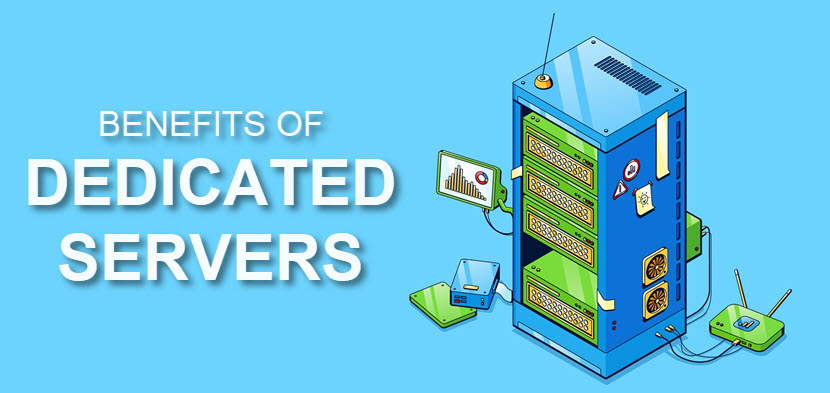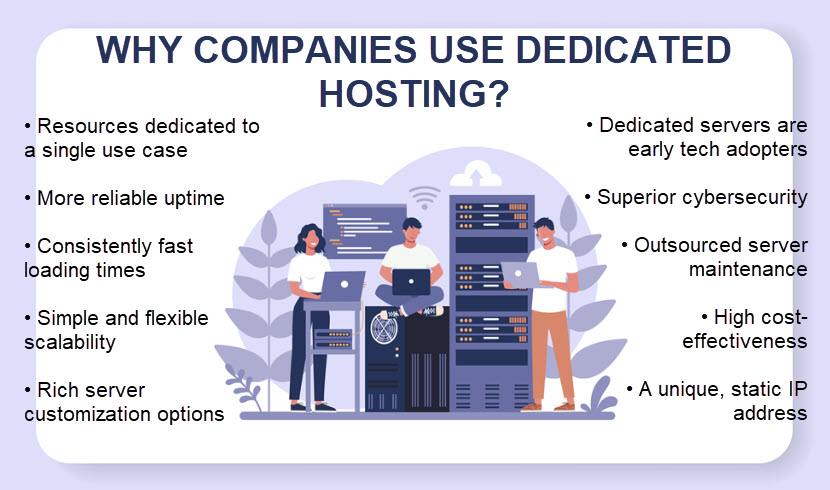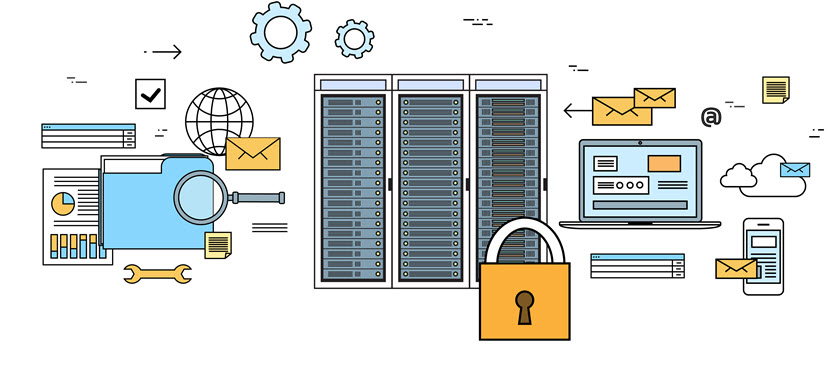Benefits of Using Dedicated Server Hosting for Your Business
A dedicated server enables a business to set up a workload-optimal IT environment and be in complete control of the hosting setup. These single-tenant servers are an upgrade from shared hosting in every regard, with notable improvements in performance, reliability, scalability, and security.
This article presents 10 dedicated server benefits that make this hosting model the go-to option for companies with advanced hosting needs. Read on to learn what you can gain from this server type and see how dedicated hosting can take your company to the next level.

10 Dedicated Server Benefits
Dedicated server benefits differ slightly based on where your hosting equipment resides. A company has three options when setting up a dedicated server:
- On-premises: You can set up a server in-house if you have skilled IT staff and a sound server room. While you have complete control over the device, upfront costs are high and network connectivity can be an concern.
- Rent a server: Instead of investing in on-prem equipment and space, you can rent a server from a service provider. You control the server configuration, but the vendor deploys the device and handles maintenance.
- Colocation hosting: Colocation enables a company to set up a privately-owned server at a third-party data center. The business invests in the dedicated server but rents the rack, cooling, power, physical security, and connectivity.
Regardless of what deployment option you choose, a dedicated server positively impacts a business and IT operations.
Below is a close look at the most impactful dedicated server benefits.

PhoenixNAP's colocation services are ideal if you own hosting equipment and wish to ensure your dedicated server enjoys the best network connectivity on the market.
Dedicated Resources
Unlike a shared server, dedicated hosting does not force you to share resources with other organizations, websites, apps, or users. As a single tenant, you have exclusive use of the server's resources, including:
- Disk space.
- CPU usage.
- Bandwidth.
- RAM.
As the entire server is at your disposal, you eliminate all significant risks and issues of shared hosting, including:
- Network congestion.
- Another tenant eating up resources and slowing down your IT operations.
- Poor loading times during peak usage or traffic hours.
- Occasional crashes.
- A tenant running a bad script that slows down your processes or introduces security threats.
- Frequent downtime.
By not competing for resources, you ensure the stability of whatever you are hosting on a dedicated server. Consistent performance improves user experience and helps build up brand reputation.
Our comparison of dedicated and shared hosting presents all the advantages a dedicated server has over a multi-tenant hosting setup.
Fast Load Speed
More available resources enable elements to load faster. Whatever you host on a dedicated server, the software will be quicker than in a shared hosting environment.
Website speed is one of the key SEO factors Google uses to determine search engine ranking, so a fast website will help push your business higher in search results. Currently, page one results on Google load in 1.19 seconds, while page two results load in 1.29 seconds. The most effective way for a complex website to achieve these speeds is to rely on a dedicated server.
Speed also has a direct impact on your bottom line. Site speed is vital to conversion rates, as illustrated by the following numbers:
- Every second added onto your load time results in 7% fewer conversions.
- A one-second delay in response time can result in 11% fewer page views.
- Nearly 40 percent of shoppers leave a website that takes more than three seconds to load fully.
- Around 46% of people who abandon an online shopping cart cite slow website speed as the reason for leaving.
The speed of dedicated hosting also enables you to add custom features to your website (video streaming, MP3s, animations, etc.) without long loading times.
Server Customization
Whether you are renting, colocating, or running a dedicated server in-house, you have total control over the hosting environment. You can adjust hardware specifications to your use case, which is not an option when using a shared server. You can also customize the server's software, which enables you to:
- Install any OS, tool, and app you require.
- Configure the server to meet the needs of your use case.
- Set up and use any resource control system.
- Deploy ideal security and create backup strategies.
- Control the way users interact with the server.
Besides hardware flexibility and root access to the server, you can also enable a web admin to script in any language they prefer.
The customization does not end at deployment. As your needs evolve, the flexibility of the server enables you to make changes to the hosting setup by adding new components and capabilities. The freedom to adjust the server to your current needs is vital to your company's ability to adapt to new opportunities or unexpected market changes.
PhoenixNAP offers a wide selection of dedicated servers optimized for common workloads (virtualization, streaming, databases, gaming, etc.). Deploy now and start benefiting from custom configurations and powerful hardware.
More Reliable Uptime
If you rely on a shared server when your traffic or usage spike, chances are that the performance will degrade quickly. High bounce rates and loss of revenue are usual consequences in that scenario.
A dedicated server ensures your site or app always runs fast and smoothly, even during peak traffic hours. As long as you configure the device correctly, users will always have a good experience no matter how much traffic or usage the server is processing.
As an extra boost to your availability, data centers hosting dedicated servers also offer top redundancy. You are unlikely to suffer downtime even during local natural disasters, fires, or power outages.

High Levels of Scalability
Providers enable you to adapt your dedicated server's hardware at any time. You can request more processing power, storage space, or bandwidth, and the vendor will adjust the server to meet the new requirements.
Depending on your current needs, a dedicated server enables you to scale both up and down. However, when you request a setup update, the IT team needs time to procure parts, build the configuration, and set it up. Some custom configurations may take several hours to deploy, or even days if you have an on-prem server.
To max out this dedicated server benefit, you must carefully schedule your scaling plans. Align server changes with your business plan instead of regularly adding and removing components while causing unnecessary downtime.
If your use case requires faster scalability, consider setting up PNAP's Bare Metal Cloud. This single-tenant server offers a cloud-like capability to scale up and down to adjust the setup to current needs.
Superior Security
Dedicated hosting is typically the preferred option for any company with high security demands. Relying on a dedicated server eliminates most security issues of shared hosting, such as:
- Suffering malware or a virus from a server tenant.
- Losing access to data or suffering downtime due to another tenant experiencing a DDoS attack.
- Malicious or accidental neighbor activity that impacts your site or app.
- A malicious actor using a server neighbor as an entry point to infiltrate the device and access your data.
The provider's in-house measures also contribute to high levels of security. These capabilities typically include top-tier protection against cybersecurity attacks and real-time server monitoring.
Dedicated hosting also enables you to customize protection measures and tailor security to your use case. The complete control over the server allows you to deploy solutions alongside (or in place of) the provider's safeguards. Your team can:
- Set up new and fine-tune existing firewalls.
- Use any anti-virus and malware program you prefer.
- Deploy an intrusion detection system (IDS).
- Create a custom disaster recovery plan.
- Limit admin access.
- Protect data with encryption at rest.
- Force users to create strong passwords and update credentials regularly.
Renting or colocating a dedicated server also enables you to rely on high-end physical protection. A data center has considerably better security than an average on-prem server room, so your device stays safe with:
- Locks with biometric scans.
- Armed guards.
- Mantraps.
- Round-the-clock video surveillance.
- Motion detection.
Customizable security and high physical protection make a dedicated server the go-to option for companies that must comply with PCI and HIPAA regulations.
Our article on the best server monitoring tools presents the different solutions you can deploy on your dedicated server to get real-time insight into operations.
Managed Services
Most providers offer managed hosting services if you decide to rent or colocate a dedicated server. Plans that include server management vary depending on what vendor you choose, but most providers are ready to handle:
- Device setup and configuration (servers, hardware updates, firewalls, switches, etc.).
- General maintenance.
- Backup and recovery responsibilities.
- Server monitoring (fault management, app health, server metrics, etc.).
- Software updates.
Managed services are an ideal option for companies that:
- Do not have (or do not want to invest in) top-tier IT staff.
- Wish to free the in-house team to focus on other business fronts.
- Are not based in the proximity of the hosting data center.
- Host mission-critical functions with little to no tolerance for downtime.
Most providers offer both fully and semi-managed services, so you can negotiate what the data center team handles and what they should leave to your staff.
If you opt to rent or host a dedicated server at a third-party facility without managed services, ensure that your team has the necessary know-how to manage the server and keep the device in good health.
PhoenixNAP's managed services enable you to offload server and infrastructure management to experts and focus on managing your business instead of hosting devices.
Cost-Effectiveness
If you do not have the budget for an in-house server room or devices needed for colocation, renting a server is a highly affordable way to ensure dedicated server benefits. You can save money and raise your overall ROI by avoiding upfront expenses on costly equipment.
Colocation and on-prem dedicated servers are also cost-effective in terms of how much value you get for your money. While cloud and shared servers may be cheaper, a dedicated server will offer much more in the way of resources and the number of users you can serve without running into issues.
Cutting-Edge Hardware
Typically, dedicated servers are the provider's priority for adopting new tech (e.g., Intel Optane memory, NVMe storage, scalable processors, etc.). If you rent a dedicated server from a top-tier vendor, you will have the option to set up and start relying on cutting-edge tech as soon as a new component enters the market (if not sooner).
In addition to the latest hardware, the lack of virtualization enables you to make the most out of server components. Dedicated hosting consistently outperforms cloud hosting for that reason. Even if the two servers have the same CPU, drive space, and RAM, a dedicated server will perform better than its cloud-based alternative.
Our comparison of cloud and dedicated servers offers an in-depth overview of the differences between the two popular hosting models.
Unique IP Address
A shared server hosts multiple clients that operate from the same IP address. If one tenant starts spamming or performing black hat SEO, search engines could penalize the IP address and impact every website on that server.
A business that opts for dedicated hosting gets a unique IP address. You do not need to worry about other tenants' activity as you are the only one responsible for the health of the server's IP address. This feature is vital for hosting a dedicated mail server or an e-commerce site that has an SSL certificate for credit card processing.
A public static IP address also means that your team does not need to update records every time a lease expires or when you rotate IP addresses.
Ready to Start Capitalizing on Dedicated Server Benefits?
While a dedicated server is not ideal for everyone, a business with a use case that requires dedicated hosting can typically not operate properly with any other hosting model. If your company could profit from the dedicated server benefits listed above, you should consider deploying or renting a server capable of keeping up with your business needs.